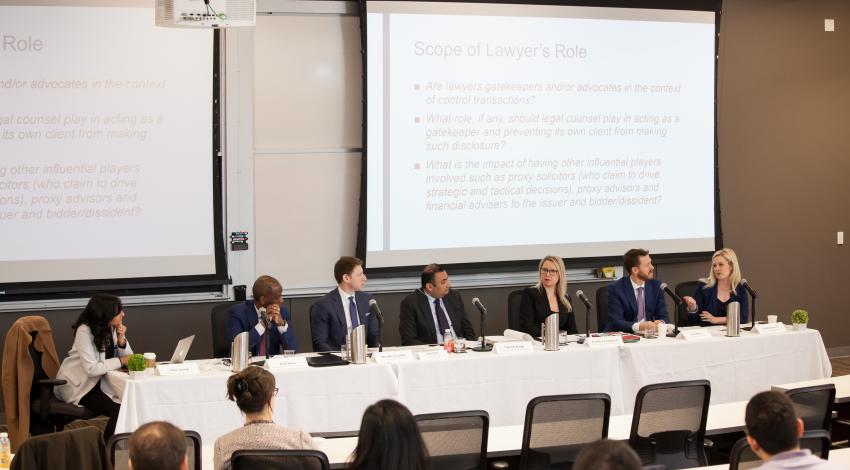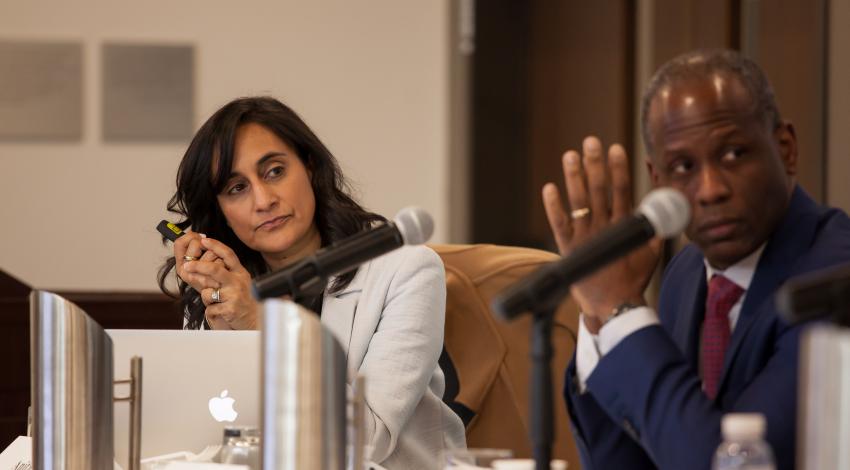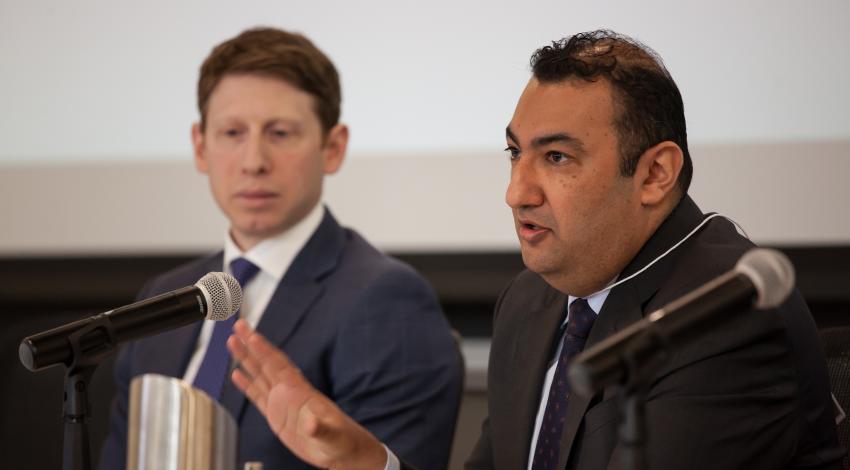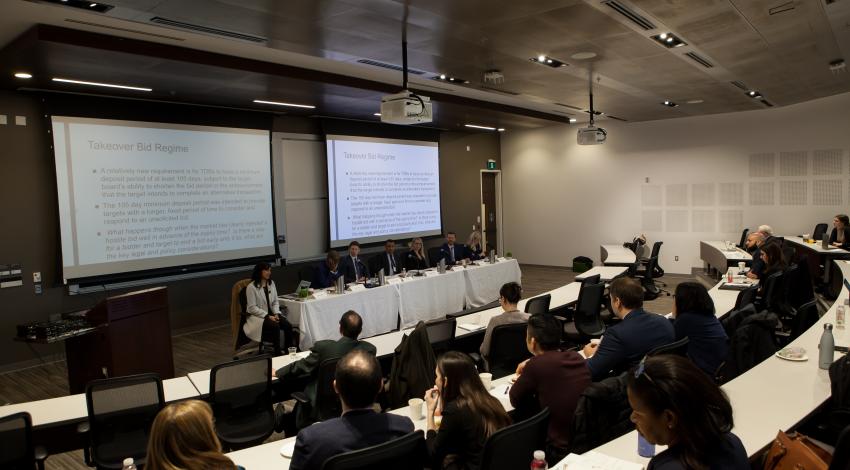Shareholder activism, lawyers’ duties, and the grey areas in between
The rise of shareholder activism in a vaguely regulated environment has expanded the role of lawyers, a panel discussion at U of T Law heard. Increasingly, lawyers’ compliance with legal and ethical standards requires careful navigation of the grey areas that mark corporate and securities law.
By Peter Boisseau / Photos by Dhoui Chang
An increase in proxy fights, as sophisticated shareholders wrestle for control of corporations, places a spotlight on that balancing act and raises complex questions about lawyers’ duties and responsibilities, said Anita Anand, J.R. Kimber Chair in Investor Protection and Corporate Governance at the University of Toronto Faculty of Law.
“We have to remember that the duties of lawyers are multi-faceted. They help their clients to devise strategies, they are intermediaries, they negotiate deals, and they interact with regulators,” Anand told the panel on Lawyers’ Duties in an Age of Shareholder Activism.
“Lawyers are playing multiple roles in contested situations, and with the rise and growth of proxy contests in Canadian capital markets, those roles have grown considerably.”
Anand says the kinds of questions raised by this development include whether lawyers are gatekeepers or advocates in situations involving proxy contests and what constitutes full and proper disclosure to shareholders.
“The parties involved in changes of control may engage, from time to time, in behavior that may be considered close to the line,” Anand noted.
“You may be representing your client to the best of your ability, but from the other side’s standpoint, or even your own, you may be dealing with grey areas.”
For example, it is not uncommon for a party involved in a proxy contest to make statements or projections in disclosure documents that are aggressive, amounting to what some would claim are clear misrepresentations or omissions, Anand said.
Adding to the complexity of the multifaceted roles that lawyers play is the fact that they not only have duties to their clients, but to regulators as well.
“These various duties raise an important question: how should lawyers balance the need to provide accurate information to regulators with their clients’ desire to achieve the best outcome possible?”
While there are comprehensive rules in securities law that are enforced by regulators like the Ontario Securities Commission, there is no such regulator when it comes to corporate law, Anand noted.
“From an academic standpoint, we often talk about the difference between a ‘rules versus principles’ approach to regulation,” she said.
“In the case of a proxy contest, the role of the securities regulator is piecemeal and very difficult to exercise, because proxy contests are not solely within the jurisdiction of the securities commission.”
Anand said one thing about which lawyers should be aware is the potential effect of the federal government’s recently introduced Bill C-97, which amends regulations governing the duty of directors to act with a view to the corporation’s best interests.
“You need to be aware of the rules and advise your client of the boundaries, and you shouldn’t knowingly assist them in breaching those rules,” said Alex Moore, LLB 1996, a partner at Blake, Cassels & Graydon LLP who specializes in mergers and acquisitions.
But Moore said his experience is that some lawyers are aggressive in terms of the advice they give clients and how much leeway they tell their clients they have.
“Sometimes you are involved in fights where you see someone do something on the other side, and you put a phone call in to the commission and nothing happens,” said Moore.
“And so, the next time you are advising your client, the scope of what you think is permissible, and what fits within that grey area, is expanded. And it’s a race to the bottom as a result.”
The existing grey areas in the regulatory regime and the uneven enforcement of the rules compounds this conundrum for legal counsel, said Moore.
“It’s easier when it’s a clear violation. It’s hard when it’s grey, and the question is, do you exploit those grey areas, or do you try to bring your client back so you’re not too close to the line?”
While he acknowledged the existence of these grey areas in rules and enforcement, the OSC’s director of mergers and acquisitions, Naizam Kanji, told the panel that the commission is more involved in policing the conduct of lawyers than most people are aware.
“People complain we’re not doing anything, but they don’t appreciate that there is a lot going on behind the scenes,” said Kanji, adding that he was expressing his personal views and not those of the commission.
“It does bother us when a lawyer is advising their clients to push the limit, either because their client wants them to, or because they are sending a signal to other potential clients that they will do anything it takes to protect the client’s interests.”
But defining those limits can sometimes be a challenge, even in areas that are otherwise closely regulated, said Moore.
He cited the example of the rules around proxy solicitation, which he said are extremely broad when it comes to determining what is permitted in relation to the timing and release of circulars and disclosures.
“When exactly should an issuer stop talking to shareholders before a shareholders meeting, when it hasn’t put out its circular yet and given disclosure to shareholders?” he asked rhetorically.
“Any kind of conversation you have with a shareholder that could be considered conditioning them to fill out a proxy in favour of your side when the time comes is potentially proxy solicitation, and that’s a grey area where I don’t think I’ve seen any enforcement at all since at least 2012.”
The problem with proxy fights is that there are not enough rules, and those that do exist are often archaic, said Paul Davis, a partner at McMillan LLP and leader of the firm’s capital markets group.
But at the end of the day, lawyers have to protect their reputations with regulators, both for their own sake and that of their client’s, said Davis, LLB 1996.
“Regulatory authorities have to be able to rely on the fact that you are telling them the truth. If they can believe what I say, it does help me long-term in dealing with them, and that helps the clients as well.”
At the end of the day, lawyers must allow their conscience to be their guide when clients want to cross the line, he added.
“I struggle with the term gatekeeper. We are acting for our clients, and if our client chooses to breach the law, we should resign.”
Lawyers’ Duties in an Age of Shareholder Activism Speakers:
Anita Anand – J R Kimber Chair in in Investor Protection and Corporate Governance at the University of Toronto Faculty of Law.
Paul Davis - Co-Chair, Capital Markets and M&A, McMillan LLP
Bradley Freelan - Partner, Fasken Martineau DuMoulin LLP
Naizam Kanji - Director, Office of Mergers and Acquisitions, OSC
Jennifer Longhurst - Partner, Davies Ward Phillips & Vineberg LLP
Alex Moore - Partner, Blake, Cassels & Graydon LLP
Heidi Reinhart - Partner, Norton Rose Fulbright






